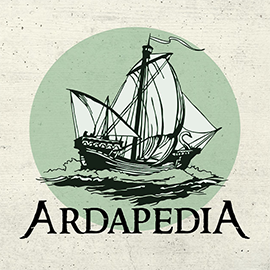Diskussion:Gothmog (Balrog): Unterschied zwischen den Versionen
Keine Bearbeitungszusammenfassung |
Keine Bearbeitungszusammenfassung |
||
| Zeile 4: | Zeile 4: | ||
Entschuldigung, aber ich würde gern wissen, wo genau steht, dass Gothmog der Sohn Morgoth's ist. Im Silmarillion habe ich keine derartigen Angaben gefunden. Eigentlich ist diese Information zu wesentlich, als dass sie in diesem Buch keine Erwähnung findet.--[[Benutzer:Kalorme|Kalorme]] 17:22, 8. Juli 2007 (CET) | Entschuldigung, aber ich würde gern wissen, wo genau steht, dass Gothmog der Sohn Morgoth's ist. Im Silmarillion habe ich keine derartigen Angaben gefunden. Eigentlich ist diese Information zu wesentlich, als dass sie in diesem Buch keine Erwähnung findet.--[[Benutzer:Kalorme|Kalorme]] 17:22, 8. Juli 2007 (CET) | ||
* In den ältesten Fassungen der Mythologie haben die Valar Söhne und Töchter. Eine verworfene Idee: | |||
<br>"''Gothmog'' 'was a son of Melko and the ogress Fluithuin and his name is Strife-and-hatred, and he was Captain of the Balrogs and lord of Melko's hosts ere fair Ecthelion slew him at the taking of Gondolin. The Eldar named him ''Kosmoko'' or ''Kosomok(o)'', but 'tis a name that fitteth their tongue no way and has an ill sound even in our own rougher speech, said Elfrith [emended from Elfriniel].' | |||
<br>(In a list of names of the Valar associated with the tale of ''The Coming of the Valar'' (I.93) it is said that Melko had a son 'by Ulbandi' called ''Kosomot''; the early 'Qenya' dictionary gives ''Kosomoko'' = Gnomish ''Gothmog,'' I.258. In the tale Gothmog is called the 'marshal' of the hosts of Melko (p. 184).) | |||
<br>In the later development of the legends Gothmog was the slayer of Fëanor, and in the Battle of Unnumbered Tears it was he who slew Fingon and captured Húrin (''The Silmarillion'' pp. 107, 193, 195). He is not of course called later 'son of Melkor'; the 'Children of the Valar' was a feature of the earlier mythology that my father discarded." | |||
<br>(The Book of Lost Tales II, The Fall of Gondolin, Notes and Commentary) | |||
<br>Daher werde ich die Zusammenwürfelung im Artikel schnell wieder auseinanderwürfeln. --[[Benutzer:Miaugion|Miaugion]] 19:41, 9. Jul. 2007 (CEST) | |||
Aktuelle Version vom 9. Juli 2007, 19:41 Uhr
Gothmog wurde laut Silmarillion von Ecthelion erschlagen. Glorfindel hat nicht den Fürst der Balrogs erschlagen sonder einen Balrog;). Ist ein Unterschied.--Carosi 18:24, 29. Nov 2004 (CET)
Die Erklärung "Gothmog (wortwörtlich: "Feind-Hass") heißt übersetzt wohl etwas wie Tod und Feuer. Insofern könnte man auch annehmen, dass es nur etwas wie ein Beiname ist." kann ich nicht ganz nachvollziehen. Außerdem sollte sie sprachlich überarbeitet werden --Cirdan 13:49, 18. Mai 2006 (CEST)
Entschuldigung, aber ich würde gern wissen, wo genau steht, dass Gothmog der Sohn Morgoth's ist. Im Silmarillion habe ich keine derartigen Angaben gefunden. Eigentlich ist diese Information zu wesentlich, als dass sie in diesem Buch keine Erwähnung findet.--Kalorme 17:22, 8. Juli 2007 (CET)
- In den ältesten Fassungen der Mythologie haben die Valar Söhne und Töchter. Eine verworfene Idee:
"Gothmog 'was a son of Melko and the ogress Fluithuin and his name is Strife-and-hatred, and he was Captain of the Balrogs and lord of Melko's hosts ere fair Ecthelion slew him at the taking of Gondolin. The Eldar named him Kosmoko or Kosomok(o), but 'tis a name that fitteth their tongue no way and has an ill sound even in our own rougher speech, said Elfrith [emended from Elfriniel].'
(In a list of names of the Valar associated with the tale of The Coming of the Valar (I.93) it is said that Melko had a son 'by Ulbandi' called Kosomot; the early 'Qenya' dictionary gives Kosomoko = Gnomish Gothmog, I.258. In the tale Gothmog is called the 'marshal' of the hosts of Melko (p. 184).)
In the later development of the legends Gothmog was the slayer of Fëanor, and in the Battle of Unnumbered Tears it was he who slew Fingon and captured Húrin (The Silmarillion pp. 107, 193, 195). He is not of course called later 'son of Melkor'; the 'Children of the Valar' was a feature of the earlier mythology that my father discarded."
(The Book of Lost Tales II, The Fall of Gondolin, Notes and Commentary)
Daher werde ich die Zusammenwürfelung im Artikel schnell wieder auseinanderwürfeln. --Miaugion 19:41, 9. Jul. 2007 (CEST)
